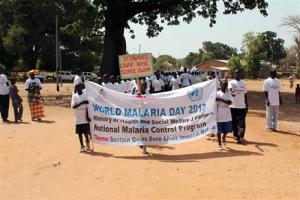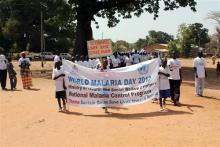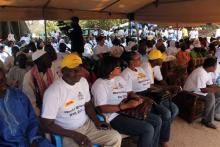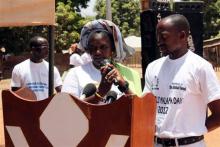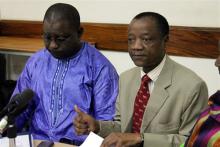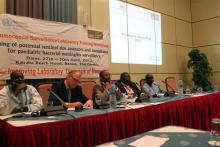Gambia observes World Malaria Day and hosts sub-regional laboratory training workshop
Banjul, 14 May 2012 -- The last week of April 2012 witnessed two important health events in the Gambia. The first was World Malaria Day and the second, a sub-regional laboratory training workshop on pneumococcal surveillance and pediatric bacterial meningitis.
World Malaria Day was officially launched on 25 April 2012 in the village of Bwiam situated in the Western Health Region. The official launch was preceded by a series of activities including a week-long public sensitization programmes on the public and private media in preparation for the Day, press briefing and televised statements by the Honorable Minister of Health and Social Welfare, Fatim Badjie and the WHO Representative, Dr Thomas Sukwa.
The key message highlighted at all the events marking the Day was that malaria, despite the gains made globally and nationally, continues to be a global and national public health problem.
Dilating on the theme “Sustain Gains, Save Lives Invest in malaria”, the National Health Authorities showcased the inroads made against malaria, thanks to the support of the Roll Back Malaria Partnership spearheaded by the World Health Organization.
The Minister however sent a word of caution. She said that despite recent studies showing decline in the incidence of malaria in the Gambia by 85.5%; admissions by 74% and malaria attributable deaths by 90%, there is no room for complacency and that efforts must be stepped up to sustain these gains.
At the press conference and in the joint WHO-UNICEF statement delivered at the national launch, the WHO Representative, Dr Thomas Sukwa, noted that much progress has been made over the past 10 years in reducing the burden of malaria globally with an estimated 38% drop in global malaria deaths in 43 countries, 11 of them in Africa.
Despite these gains, Dr Sukwa noted that malaria still poses great challenges to the African Region, which accounts for 81% of the world’s malaria cases and over 90% of deaths attributable to the disease.
Whilst congratulating the Gambia on the achievements enumerated above, Dr Sukwa urged the national authorities to pay greater attention to improving as well as sharing with WHO high quality national malaria data if the Gambia’s achievements are to be adequately reflected in the global and regional malaria reports.
Other speakers at the event were the head of Bwiam village and the Governor of West Coast Region, both expressing their support to malaria prevention and control. The Governor, in particular, said that his region recognized malaria as a development problem and promised henceforth the disease would always feature in the Technical Advisory Committee meetings regularly conducted by his office.
The well-attended national launch was graced by a host of dignitaries from the health sector, UN agencies, the private sector, the national roll back malaria partners and local communities.
The second event was the 3rd sub-regional pneumococcal surveillance laboratory training workshop held during the last week of April 2012, and attended by 22 African countries.
The workshop was organized by the WHO/AFRO in collaboration with the MoHSW and the Medical Research Council (MRC) Unit. WHO-HQ and CDC of the United States also attended the consultative workshop that followed the training.
This year’s theme, “improving laboratory diagnosis of bacterial meningitis”, served another opportunity to remind participants of the need to generate and share high quality data in a bid to improving pneumococcal surveillance in the sub-region region.
According to Dr Jason Mwenda, IVD/AFRO Focal Point, who represented the WR at the closing ceremony, much progress has been made in supporting informed decision making on new vaccine introduction in the African Region since the establishment of the Hib-Paediatric meningitis sentinel surveillance in 2002. He said that 44 out of the 46 countries in WHO Africa region have introduced Hib vaccine into their national immunization programmes. Peumococcal conjugate vaccine (PCV) has also been introduced in 13 countries and several other countries are scheduled to introduce PCV in 2012, Dr Mwenda noted.
However, to sustain these gains, “robust surveillance systems must be put in place to provide a solid platform for vaccine effectiveness assessment, using a case-control design as well as an assessment of the economic burden of diseases such as meningitis, pneumonia, sepsis and diarrhoea.
In conclusion, Dr Mwenda thanked participants for their invaluable contributions to strengthening surveillance of vaccine preventable diseases in the African Region.
Speaking earlier on behalf of the Minister of Health and Social Welfare, the Director of the National Public Health Laboratory, Mr Mamodou Bah, expressed gratitude to the WHO and the MRC Unit for all their support in conducting such a useful training in the Gambia. He also added his weight to the call for improving and sharing high quality data for informed decision making.
Gambia observes World Malaria Day and hosts sub-regional laboratory training workshop



